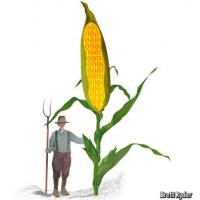Climate and Economics
The Economist recently covered the relationships among climate change, agriculture, and big data in "Digital disruption on the farm."
Big data--a catch term for examining the massive, available, digital data sets for emergent relationships--stands to help and change agriculture.
Agriculture, with long-term records on soils, yields and land prices, in combination with weather records is the focus of some big data pursuits. For example, in October 2013, Monsanto purchased a startup company which had aggregated data for all 25 million fields in America to the tune of $1 billion dollars.
Why? Prescriptive planting.
Based on this information, prescriptions of appropriate seed varieties can become as variable as other precision agriculture applications already in use. Specific prescriptions can respond to climatic shifts. According to the article, this “could be the biggest change to agriculture in rich countries since genetically modified crops.”
The benefits to producers are higher yields. But this comes at the cost of privacy and perhaps competitive advantage. Still, the biggest names in corporate agriculture teamed with spatial information companies (John Deere/DuPont Pioneer; Land O’Lakes/Geosys; Monsanto/Climate Corporation) are collecting data, preparing products, and some are already marketing their big data products for prescriptive planting and precision agriculture on the large scale.
Author: Leigh Bernacchi
Around the Web is REACCH's blog about timely news articles covering agriculture and climate change interests for our stakeholders.


